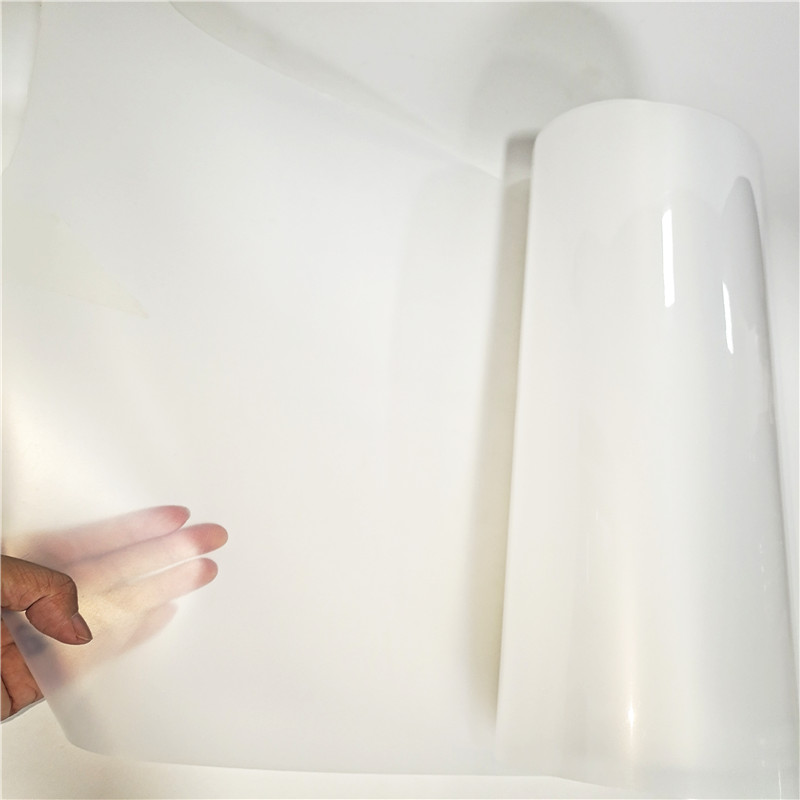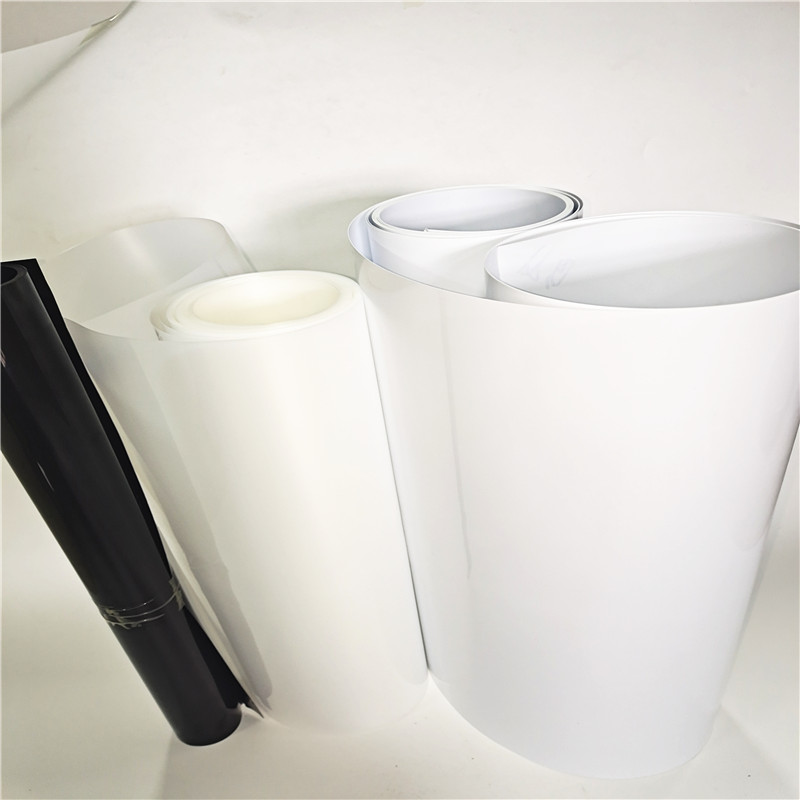Our advantages:
1>PVC,pet ,PP,PS,PC Factory
2>Lowest price
3>Best quality
Please check the photos for your reference.
If you have any Plastic film or sheet inquiry, please contact us freely.


Polypropylene (PP) is limited in its application as an engineering plastic due to its small modulus, strong notch sensitivity, and low impact strength, especially low impact strength at low temperatures and high strain rates. The toughness of PP is usually increased by adding elastomers, but the addition of elastomers tends to increase the toughness of PP while reducing stiffness and hardness. Therefore, we try to use inorganic fillers to increase the mechanical properties of PP. Adding inorganic fillers can improve a number of mechanical and thermodynamic properties of the material, including stiffness, creep resistance, heat distortion temperature, shrinkage, etc., but on the other hand, the presence of inorganic fillers often reduces the tensile strength and toughness of the material .
The influence of inorganic fillers on the mechanical properties of materials mainly depends on the shape, particle size, particle agglomerate size, particle surface characteristics and polymer matrix properties of rigid inorganic particles. The following describes the application of commonly used inorganic fillers in reinforcing and toughening polymers.
Application of calcium carbonate in strengthening and toughening PP
Calcium carbonate products are divided into heavy calcium carbonate and light calcium carbonate.
Heavy calcium carbonate is abbreviated as heavy calcium (GCC), which is made by mechanically crushing natural calcite, limestone, white solace, shells, etc. directly. Since the sedimentation volume of heavy calcium carbonate is smaller than that of light calcium carbonate, it is called heavy calcium carbonate. At present, there are two main processes for industrial production of heavy calcium carbonate, one is the dry process, and the other is the wet process. Compared with wet process, dry process can produce products with lower cost and wide range of applications.
Light calcium carbonate is abbreviated as light calcium (PCC). It is calcined limestone and other raw materials to produce lime whose main components are calcium oxide and carbon dioxide, and then add water to digest the lime to produce lime milk. The main component is calcium hydroxide, and then enter the carbon dioxide to carbonize the lime milk. The calcium carbonate precipitate is formed, which is finally obtained by dehydration, drying and crushing. Or firstly use sodium carbonate and calcium chloride to perform metathesis reaction to generate calcium carbonate precipitation, and then it is prepared by dehydration, drying and crushing.
Calcium carbonate is one of the earliest inorganic fillers used to fill reinforced and toughened PP, and the application of micron calcium carbonate has always been in a dominant position. Studies have shown that the addition of calcium carbonate can increase the impact strength of PP, but reduce the tensile strength. The addition of light calcium carbonate can increase the impact strength and yield strength at the same time, and the effect of PCC treated with stearic acid is better. , Calcium carbonate treated with titanate coupling agent can significantly improve the impact strength of PP.
With the advent of nanometer calcium carbonate, nanometer calcium carbonate can simultaneously strengthen and toughen, and the toughening effect is better than micrometer calcium carbonate. Studies have shown that the shape of nano calcium carbonate is different, and the mechanical properties of composite materials are also very different. Cubic nano-calcium carbonate is beneficial to improve the impact properties of composite materials, while fibrous nano-calcium carbonate can significantly improve the tensile properties of PP composites. Nano-calcium carbonate can significantly refine PP spherulites and promote β crystals Type generation.
Application of glass beads in strengthening and toughening PP
Glass beads (GB) is a new type of silicate material, including solid and hollow. Generally, glass beads with a particle size of 0.5~5 mm are called fine beads, and those with a particle size of less than 0.4 mm are called microbeads; there are many kinds of microbeads according to different sources. Fly ash glass beads are in fly ash It is a kind of light micro-spherical substance extracted. Its main component is silicon dioxide. It also contains a variety of metal oxides. Fly ash glass beads have the advantages of high temperature resistance and low thermal conductivity. They can be used to fill plastics. Increase the wear resistance, compression resistance, flame retardancy and other properties of the material, and its special spherical surface can also improve the processing fluidity of the material. In addition, its surface gloss is good, which can increase the surface gloss of the product and reduce the surface dirt adsorption .
GB is widely used to strengthen and toughen PP. Studies have shown that as the amount of GB increases, the tensile elastic modulus, flexural strength and flexural elastic modulus of single and twin-screw extruded PP/GB composites all show a linear increase trend, while the yield strength decreases slightly; The breaking strain increases when the content is low, and then decreases rapidly. The impact strength of single-screw and twin-screw extruded materials is increased, and increases with the increase of the amount of GB within a certain range. The impact strength is slightly higher than that of the twin-screw extruded material, and the GB particle size has a greater impact on the toughness of the PP/GB composite.
Application of silicate minerals in strengthening and toughening PP
At present, the most widely used and studied silicate minerals are talc, montmorillonite, wollastonite, etc. Among them, attapulgite and zeolite have also received more attention.
Talc and montmorillonite (MMT) are both layered silicate minerals. Talc is a magnesium silicate mineral with a flaky structure. Generally, the finer the particle size, the better the dispersion effect, which can increase the thermal deformation temperature of the material and reduce the surface roughness; the MMT layer has a large spacing, and the intercalation method is often used to prepare PP Composite materials, MMT can form a good intercalation structure in the PP matrix, thereby improving the impact resistance and dimensional stability of PP.
Attapulgite (ATP) is a chain layered silicate. ATP is a natural one-dimensional nano-material silicate mineral. Its basic structural unit is needle-like or short-fibrous single crystal. ATP can be compounded with PP at two levels of micro-filling and nano-reinforcement to improve the mechanics of PP composites. performance. This new type of clay short fiber overcomes the shortcomings of general glass fiber reinforced plastics such as poor fluidity, rough appearance, and serious wear on processing equipment, so it has high development value.
Wollastonite is a single chain silicate mineral, usually in sheet, radial or fibrous aggregates. Studies have shown that wollastonite-filled plastic can not only improve its mechanical properties, but also can be used instead of glass fiber to reduce costs. However, as the amount of filling increases, the hardness of the composite material becomes larger, and the wear of the processing equipment is more serious.
Zeolite is a framework silicate mineral. It has a rich pore structure, which can prepare highly functional polypropylene composite materials by adsorbing or loading functional particles to increase the added value of the product. Therefore, the development of PP/zeolite functional composite materials has great potential and has become a hot spot of current research and attention.
Application of Titanium Dioxide in Strengthening and Toughening PP
The chemical composition of titanium dioxide is titanium dioxide. There are rutile type and anatase type. Rutile type is the most stable crystalline form. It has a compact structure and is better than anatase type in hardness, weather resistance and pulverization resistance. This chemical substance is stable, insoluble in water, and has good heat resistance. After titanium dioxide is added, it can not only increase the whiteness of PP products, but also reduce the damage of ultraviolet rays, improve the light aging resistance of PP, and increase the rigidity, hardness and wear resistance of products, but it is more compatible with PP. Poor, must be compatibilized.






